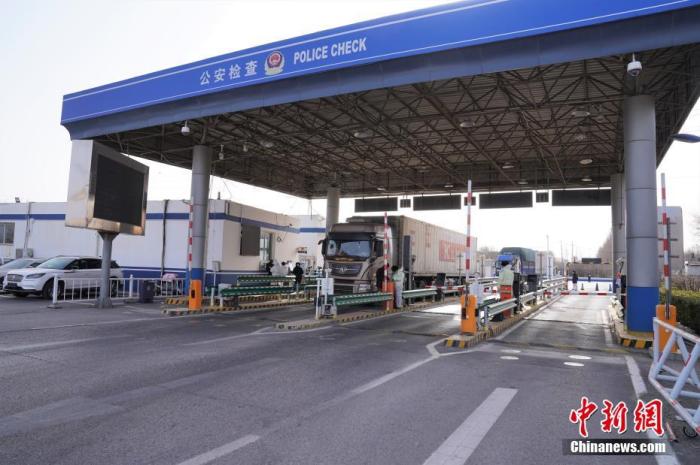(Fighting against new crown pneumonia) How can Hebei stop the spread of the epidemic to Beijing and Tianjin?
China News Service, Shijiazhuang, January 15th, title: How can Hebei stop the spread of the epidemic to Beijing and Tianjin?
China News Agency reporter Lu Da Chen Lin
A new crown pneumonia epidemic is occurring in Hebei surrounding Beijing and Tianjin.
How to effectively stop the spread of the epidemic and avoid spreading to neighboring provinces and cities such as Beijing and Tianjin has attracted attention.
External defense output: the "three lines of defense" strictly prevent external output of the epidemic
Hebei, the important land of Gyeonggi, is located in North China, bordering the Bohai Sea in the east, the inner ring of Beijing and Tianjin, adjacent to Shandong, Henan, Liaoning, Shanxi, Inner Mongolia Autonomous Region and other places, involving more than 3,700 kilometers of provincial boundaries, of which many districts and cities and Beijing , Tianjin borders.
Since the outbreak of the epidemic in Shijiazhuang and Xingtai in southern Hebei, the Hebei public security department started high-level duties on the "three lines of defense" in the province at 8 o'clock on January 5.
On the Ring-Beijing Defense Line, 38 checkpoints and 50 entry-to-Beijing small road junctions were activated, and all other entry-to-Beijing small road junctions were physically separated and manned 24 hours a day.
In the defensive line around the province, checkpoints are set up in the direction of expressways and national and provincial roads, and checkpoints are set up in the direction of county and township roads and small intersections. In principle, "not necessary, do not leave the province."
In the provincial defense line, 181 checkpoints have been launched in key areas of Shijiazhuang and Xingtai, and two-way persuasion will be implemented for vehicles entering and exiting through expressways, national and provincial highways and other roads.
Zhang Wei, head of the Nanjianta Public Security Checkpoint at the junction of Langfang, Hebei and Beijing, said that all vehicles entering Beijing must be inspected every vehicle, temperature must be measured at every person, identity verified at every person, and information must be recorded at every inspection. Everyone must look at the itinerary code and health code.
The reporter learned from the public security department that Hebei is around Beijing, and there are stations in the province for departures into Beijing. The main highway entrances into Beijing, national and provincial highways, and Hebei province have all established epidemic control stations.
Hebei has also worked closely with public security agencies around Beijing and six other provinces and cities to strengthen joint prevention and control, and make every effort to prevent the epidemic from being exported outside the province.
An Zhongqi, Deputy Secretary of the Party Committee and Executive Deputy Director of the Public Security Department of Hebei Province, said that after the outbreak of the epidemic in some areas such as Shijiazhuang and Xingtai, the provincial party committee and the provincial government clearly put forward the requirements of "internal non-proliferation and external defense". Act immediately, quickly start high-level services, implement the most stringent emergency control measures, resolutely prevent the spread of the epidemic in the province, export to outside the province, and resolutely safeguard the safety of the capital.
Data map: Policemen on duty at the Nanjianta Public Security Checkpoint of the Public Security Bureau of Langfang City, Hebei Province are verifying relevant certificates of personnel entering Beijing.
Photo by Song Mintao, China News Agency reporter
Internal non-proliferation: Shijiazhuang, Xingtai, Langfang closed management
Reducing the movement of people and vehicles is the key to stopping the spread of the epidemic.
At the same time as external defense output, internal non-proliferation is equally important.
In this round of the epidemic, many cases have concentrated activities, and the movement trajectory is complicated.
From the 6th, Shijiazhuang, which has a large number of cases, took the lead in launching a closed-loop management of all communities and rural areas in the city, requiring all residents to conduct nucleic acid testing at home.
Currently, Shijiazhuang, Xingtai, and Langfang where confirmed cases have been found have all implemented closed management.
On the evening of the 15th, the reporter saw in Shijiazhuang that there were fewer cars and pedestrians on the streets of the urban area, and most shops were closed.
At the exit of the street-side community, the staff is controlling the entry and exit.
The high-speed intersection of Yuhua Road entering and leaving the urban area is closed, and policemen in protective clothing are carrying out traffic control.
On the roadside display, it reads "Unity to fight the epidemic".
It is understood that in terms of internal non-proliferation, the Hebei police set up epidemic control stations at the entrances and exits around Shijiazhuang, Xingtai, Gaocheng, and Nangong, and implemented two-way persuasion for vehicles and personnel to return.
Roads in other villages are physically separated and patrolled and guarded 24 hours a day to ensure that vehicles and people do not leave the village, county, or city.
Meng Xianghong, deputy mayor of Shijiazhuang City, said that the city has 1,105 stations of various types, including 162 checkpoints for inspection and control.
Passenger flights have been completely suspended except for aid materials and medical team flights in other places.
All passenger stations in the city were closed, and passenger access was suspended.
It is understood that in order to ensure the normal operation of the city, a pass management system is implemented for emergency and livelihood vehicles.
As of the 14th, there are 553 local confirmed cases in Hebei Province.
With the end of the second round of nucleic acid testing for all employees in many places, there may be additional cases, and the situation of epidemic prevention and control remains grim.
(Finish)

